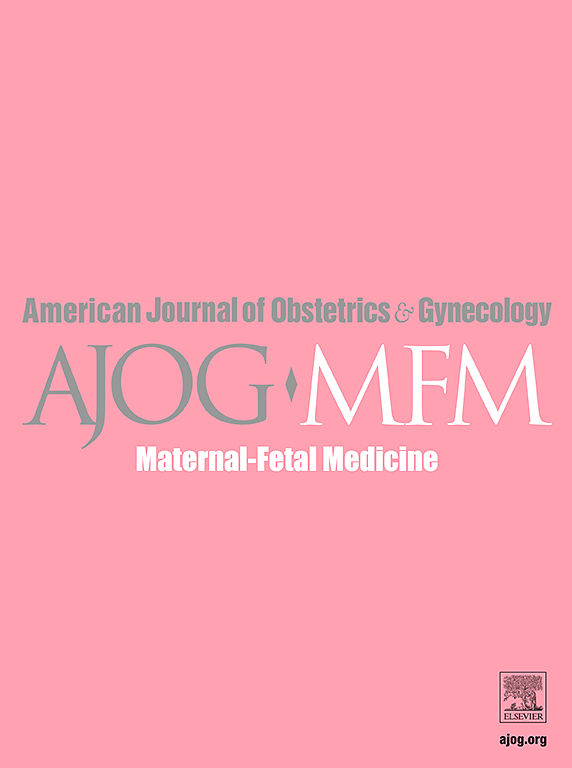Next-generation sequencing–based approach for fetal DNA quantification and blood antigen detection in alloimmunized pregnancies
IF 3.1
2区 医学
Q1 OBSTETRICS & GYNECOLOGY
American Journal of Obstetrics & Gynecology Mfm
Pub Date : 2025-05-13
DOI:10.1016/j.ajogmf.2025.101694
引用次数: 0
Abstract
BACKGROUND
Erythrocyte and platelet alloimmunization during pregnancy can be severe and are closely monitored throughout pregnancy. However, the blood type of the fetus and the associated risk are often unknown. Here, fetal erythrocyte and platelet genotype from maternal plasma were determined using next-generation sequencing, providing noninvasive prenatal testing as an alternative to traditional methods for monitoring alloimmunized pregnancies.
OBJECTIVE
This study aimed to validate an innovative next-generation sequencing method for the detection of specific blood antigens in maternal plasma-derived cell-free DNA, focusing on key antigens associated with immunizations. By analyzing free-circulating fetal DNA across various gestational stages, the study seeks to achieve high-precision identification of clinically relevant erythrocyte and platelet antigens.
STUDY DESIGN
Maternal whole blood samples were consecutively collected from 74 immunized and nonimmunized pregnant women at 13 to 27 weeks of gestation in Stockholm County, Sweden. Next-generation sequencing analysis was performed on maternal plasma using a prototype kit from Devyser AB (Stockholm, Sweden). The kit detects several erythrocyte blood group markers, 2 human platelet antigen markers (HPA-1 and HPA-5), XY chromosome markers, and 12 insertions and deletions from different chromosomes to identify and quantify fetal DNA. After birth, genomic DNA from umbilical cord blood samples were genotyped with various methods and compared with noninvasive prenatal testing results obtained during pregnancy.
RESULTS
A total of 95 samples from 74 pregnancies were analyzed. Fetal DNA was successfully identified in 72 of 74 cases (97.3%) using insertion and deletion and Y chromosome markers. In 2 cases, fetal DNA could not be detected because of the absence of informative markers. The noninvasive prenatal testing results showed 100% concordance with the genotyped newborns. Among the fetuses of 22 immunized women, 6 were antigen negative, 10 were antigen positive, 5 had antigens not included in the next-generation sequencing panel (3 anti-Cw, 1 anti-M, and 1 anti-Ge2), and 1 had an inconclusive result.
CONCLUSION
Our study highlights the feasibility of using next-generation sequencing for comprehensive fetal antigen screening, paving the way for a personalized approach to managing alloimmunized pregnancies. By accurately identifying fetuses expressing antigens corresponding to maternal antibodies and those not at risk, it enhances the precision of targeted care.

同种异体免疫妊娠胎儿DNA定量和血液抗原检测的新一代测序方法。
背景:妊娠期间红细胞和血小板同种异体免疫可能是严重的,在妊娠期间密切监测,然而,胎儿的血型和相关的风险往往是未知的。在这项研究中,我们使用下一代测序(NGS)从母体血浆中测定胎儿红细胞和血小板基因型,提供了一种非侵入性检测(NIPT),作为监测同种异体免疫妊娠的传统方法的替代方法。目的:本研究旨在验证一种创新的NGS方法,用于检测母体血浆来源的无细胞DNA中的特异性血液抗原,重点关注与免疫相关的关键抗原。通过分析不同妊娠阶段的自由循环胎儿DNA,该研究旨在实现临床相关红细胞和血小板抗原的高精度鉴定。研究设计:在瑞典斯德哥尔摩县连续采集74名13-27孕周免疫和未免疫孕妇的全血样本。使用Devyser AB(瑞典斯德哥尔摩)的原型试剂盒对母体血浆进行NGS分析。该试剂盒检测几种红细胞血型标记物、两种人血小板抗原标记物(HPA-1和HPA-5)、x染色体标记物和12个不同染色体的插入和缺失(Indels),以鉴定和定量胎儿DNA。出生后,用各种方法对脐带血样本的基因组DNA进行基因分型,并与怀孕期间获得的NIPT结果进行比较。结果:共分析74例妊娠95份样本。利用Indel和y染色体标记,74例中有72例(97.3%)成功鉴定出胎儿DNA。在两例中,由于缺乏信息标记,胎儿DNA无法检测到。NIPT结果与新生儿基因型100%一致。在22名免疫妇女中,6名胎儿抗原阴性,10名胎儿抗原阳性,5名胎儿的抗原未包括在NGS小组中(3名抗cw, 1名抗m, 1名抗ge2), 1名结果不确定。结论:本研究强调了使用NGS进行全面胎儿抗原筛查的可行性,为个性化处理同种异体免疫妊娠铺平了道路。通过准确识别表达与母体抗体相对应的抗原的胎儿,以及那些没有风险的胎儿,它提高了靶向护理的准确性。
本文章由计算机程序翻译,如有差异,请以英文原文为准。
求助全文
约1分钟内获得全文
求助全文
来源期刊

American Journal of Obstetrics & Gynecology Mfm
Medicine-Medicine (all)
CiteScore
7.40
自引率
3.20%
发文量
254
审稿时长
40 days
期刊介绍:
The American Journal of Obstetrics and Gynecology (AJOG) is a highly esteemed publication with two companion titles. One of these is the American Journal of Obstetrics and Gynecology Maternal-Fetal Medicine (AJOG MFM), which is dedicated to the latest research in the field of maternal-fetal medicine, specifically concerning high-risk pregnancies. The journal encompasses a wide range of topics, including:
Maternal Complications: It addresses significant studies that have the potential to change clinical practice regarding complications faced by pregnant women.
Fetal Complications: The journal covers prenatal diagnosis, ultrasound, and genetic issues related to the fetus, providing insights into the management and care of fetal health.
Prenatal Care: It discusses the best practices in prenatal care to ensure the health and well-being of both the mother and the unborn child.
Intrapartum Care: It provides guidance on the care provided during the childbirth process, which is critical for the safety of both mother and baby.
Postpartum Issues: The journal also tackles issues that arise after childbirth, focusing on the postpartum period and its implications for maternal health. AJOG MFM serves as a reliable forum for peer-reviewed research, with a preference for randomized trials and meta-analyses. The goal is to equip researchers and clinicians with the most current information and evidence-based strategies to effectively manage high-risk pregnancies and to provide the best possible care for mothers and their unborn children.
 求助内容:
求助内容: 应助结果提醒方式:
应助结果提醒方式:


